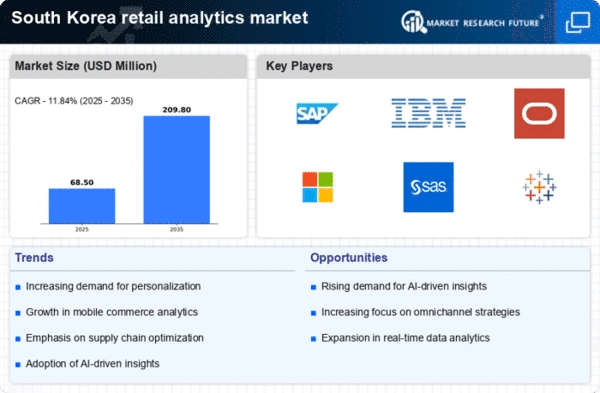Growing Importance of Personalization
Personalization is becoming a cornerstone of retail strategies, significantly impacting the retail analytics market in South Korea. Retailers are leveraging analytics to create tailored shopping experiences that resonate with individual consumer preferences. Approximately 70% of consumers express a preference for personalized marketing, prompting retailers to invest in analytics solutions that facilitate targeted promotions and recommendations. This trend not only enhances customer satisfaction but also drives sales growth, as personalized experiences are linked to higher conversion rates. The increasing emphasis on personalization is likely to propel the demand for advanced analytics tools, further shaping the retail analytics market.
Integration of Omnichannel Strategies
The integration of omnichannel strategies significantly influences the retail analytics market in South Korea. Retailers are increasingly adopting a seamless approach to connect online and offline channels, which necessitates advanced analytics capabilities. Approximately 60% of retailers have reported implementing omnichannel strategies to enhance customer experience and drive sales. This shift requires sophisticated analytics tools to track customer interactions across various touchpoints, allowing businesses to gain a comprehensive understanding of consumer journeys. Consequently, the demand for analytics solutions that can provide insights into channel performance and customer preferences is on the rise, shaping the future landscape of the retail analytics market.
Rising Demand for Data-Driven Insights
The retail analytics market in South Korea experiences a notable surge in demand for data-driven insights. Retailers increasingly recognize the value of leveraging analytics to understand consumer behavior and preferences. This trend is evidenced by a reported growth rate of approximately 15% in the adoption of analytics tools among retailers in the past year. As competition intensifies, businesses are compelled to utilize data analytics to optimize inventory management, enhance marketing strategies, and improve overall operational efficiency. The ability to derive actionable insights from vast datasets is becoming a critical differentiator in the retail analytics market, enabling companies to tailor their offerings and drive customer engagement effectively.
Investment in Technology Infrastructure
Investment in technology infrastructure is a critical driver of the retail analytics market in South Korea. Retailers are allocating substantial resources to upgrade their IT systems and analytics capabilities, recognizing the need for robust data management solutions. Recent reports suggest that spending on analytics technologies has increased by approximately 25% over the past year, reflecting a commitment to harnessing data for strategic decision-making. This investment enables retailers to implement sophisticated analytics tools that can process large volumes of data efficiently, ultimately enhancing their competitive edge. As technology continues to evolve, the retail analytics market is poised for sustained growth driven by these infrastructure investments.
Emergence of Advanced Predictive Analytics
The emergence of advanced predictive analytics is reshaping the retail analytics market in South Korea. Retailers are increasingly utilizing predictive models to forecast demand, optimize pricing strategies, and enhance inventory management. Recent studies indicate that predictive analytics can improve inventory turnover rates by up to 20%, thereby reducing excess stock and minimizing costs. This capability allows retailers to make informed decisions based on anticipated consumer behavior, ultimately leading to increased profitability. As the retail landscape evolves, the integration of predictive analytics into business strategies is likely to become a standard practice, driving further growth in the retail analytics market.
















